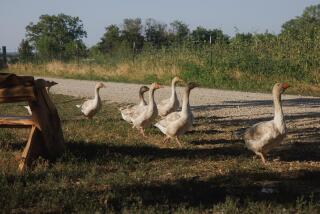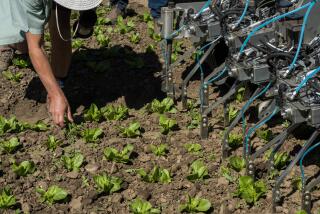Organic Farms Viable Despite Lower Yields, Study Finds
A 21-year Swiss study of organic and conventional farming systems is providing new evidence that large-scale organic farming is economically viable and environmentally sustainable over the long haul, although crop yields still fall short of conventional methods.
The study, published in today’s issue of Science, reported that organic farming methods used 50% less energy, 97% less pesticide and as much as 51% less fertilizer than conventional methods.
For the record:
12:00 a.m. June 22, 2002 For The Record
Los Angeles Times Saturday June 22, 2002 Home Edition Main News Part A Page 2 National Desk 7 inches; 259 words Type of Material: Correction
Hudson Institute--A May 31 story in Section A on organic farming mischaracterized the Indianapolis-based Hudson Institute as an industry-funded think tank. The not-for-profit institute receives its funding from a variety of sources including foundations, private donations, corporations and the federal government.
After two decades of cultivation, the soil in the study’s test plots was still rich in nutrients, resistant to erosion and readily water absorbent.
Overall, organic crop yields averaged about 20% less than conventionally farmed crops, although the differences covered a wide range. Potato yields, for example, were 58% to 66% of those produced by conventional means. The production of wheat reached 90% of a conventional harvest.
Since 1981, only a handful of major scientific studies have compared the two farming systems. The Swiss study is the longest running farming project conducted to date.
John Reganold, a soil scientist at Washington State University at Pullman and a leading investigator of organic farming methods, applauded the Swiss group’s tenacity and praised the breadth of their study.
“To run a study for 21 years, to measure yields, look at soil, look at weeds, look at insects, it takes a lot of scientists,” he said.
However, Alex Avery, director of global food issues for the Hudson Institute, an industry-funded think tank based in Indianapolis, said the Swiss report only validates what was previously known about a niche form of agriculture, and that the experiment ignores the latest conventional farming techniques.
“Organic farmers are wonderful people, but I think they way oversell their product and their process,” Avery said.
The study, co-sponsored by the Swiss government, began in 1978 as a bid to bring scientific methodology to what had been a largely philosophical argument over which type of agriculture was the more sustainable.
Conventional farming, the type practiced most widely around the world since World War II, relies on synthetic fertilizers and pesticides, mainly derived from fossil fuels.
By contrast, organic farming, which has been popularized by environmentalists, relies on fertilizers derived from composted animal manure and the practice of crop rotation with nitrogen-fixing cover crops such as clover.
When the study began, “it was a time of skepticism,” said agronomist Andreas Fliessbach, one of six authors on the study. “It was a time when nobody really believed broad scale organic farming would be feasible.”
To measure the benefits and drawbacks of each system, the researchers set up 96 small plots on a site near Basel, Switzerland where they grew wheat and potatoes on a seven-year crop rotation cycle.
After three cycles, Fliessbach said that the advantages conferred by the organic system could be divided into “below ground benefits” and “above ground benefits.”
Below-ground benefits included a rich diversity of microorganisms, which in turn led to better soil structure, more efficient plant growth and superior water absorbency. Higher counts of beneficial insects such as earthworms contributed to soil fertility and reduced fertilizer requirements by half.
Above ground, organic farming proved resistant to the classical scourges of farming crops : drought and erosion. It also eliminated the problems of pesticide and nitrogen fertilizer pollution.
The study is the second comparison between organic and conventional systems to be published in a leading science journal in the last two years.
In April 2001, Washington State’s Reganold published a six-year study in the magazine Nature, concluding that organic apple farming was not only better for the soil and the environment than its conventional counterpart but had comparable yields, higher profits and greater energy efficiency.
Reading the Swiss study, Reganold was struck by what he called the “differentials.” “Organic wheat yields were about 90% of conventional. That’s incredible,” he said. “To get that kind of a yield with half the fertilizer is pretty impressive.”
Defending conventional production, Avery said: “What’s interesting about the Swiss paper is what’s not in it.” A new conventional system avoids erosion by eliminating plowing to dislodge weeds.
“Instead of tilling, you use herbicides,” he said. Avery also contended that crop rotations and reduced yields of 15% to 40% would devastate American farmers.
But Bill Liebhardt, director of research and training at the Rodale Institute Research Center in Kutztown, Pa., has analyzed most of the U.S. comparative studies of the two systems and found organic yields are even higher than those found in the Swiss study--as high as 95% of conventional methods.
The Swiss study did not include an economic comparison of the two systems. On the face of it, said Fliessbach, conventionally farmed food is cheaper.
However, a true figure would be hard to calculate. “Costs like soil erosion, or pollution of ground water or climate change, these costs are not covered when you run comparisons between organic and conventional products,” Fliessbach said. “Society is paying these costs.”






